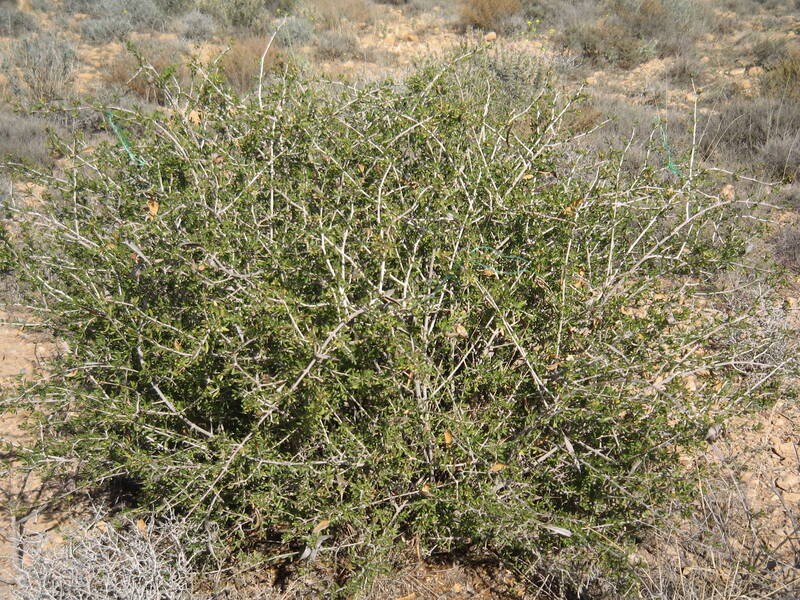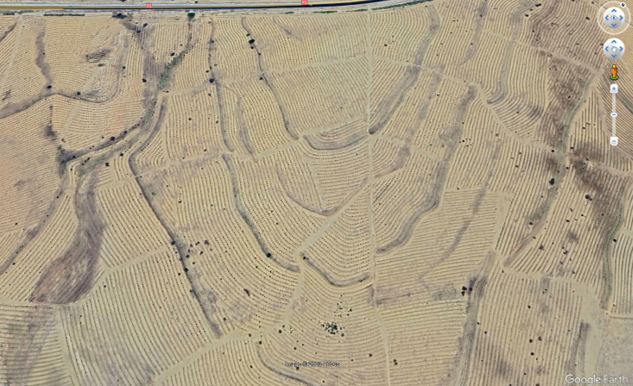Native Species Restoring Degraded Silvopastoral Systems in Dry Regions
- From
-
Published on
10.01.24
- Impact Area

Using native species to restore degraded silvopastoral systems in arid areas – a transformative solution for a sustainable and resilient future.
Silvopastoral systems – integrated farming systems in which livestock grazing and pasture are combined with trees/shrubs – in North Africa, particularly in Tunisia, they are rapidly degrading through the loss of natural vegetation cover and biological diversity over the past decades. This degradation is primarily caused by human activities such as overgrazing and cultivation, as well as unpredictable and extreme weather, including frequent droughts. The economic and ecological consequences of this degradation are severe.
To tackle this pressing issue, local governments and development agencies must implement restoration measures urgently. In cases of irreversible degradation where natural regeneration is no longer viable, the use of innovative rehabilitation techniques becomes essential. Drawing from past attempts using non-native grass reseeding or the introduction of unsuitable ecologically demanding exotic shrubs that were found to consume excessive water, in consultation with its partners, ICARDA identified well-adapted native species and the most appropriate techniques for their domestication and multiplication for large-scale rehabilitation of degraded silvopastoral systems in dry regions.

Exotic Varieties’ Limitations
Within the framework of the CGIAR’s Livestock and Climate Initiative, ICARDA, in collaboration with national partners, development agencies (DGF, OEP, and ODESYPANO), research institutions, and community-based organizations, is leading efforts to transform national programs and strategies concerned with rehabilitation of silvopastoral systems.
Indigenous species were often overlooked in favor of exotic ones due to the rapid growth and ready availability of exotic seeds in the local market. Furthermore, public nurseries have developed extensive expertise in handling exotic species throughout history.
However, several challenges were identified including a huge demand for a limited range of plant species, insufficient nursery capacity, and an incomplete understanding of best practices for propagating certain species. Issues such as the lack of national coordination for seed collection and multiplication, resulting in the insufficient capacity to meet projected needs. In addition, the quality of seedling produced has been recognized as a limiting factor. Priority actions involve reducing pressure on remnant plant populations, mapping suitable agroecological sectors, and ensuring an adequate supply of quality seeds for revegetation.
Through various awareness events, including webinars, field days and training courses, ICARDA emphasized the value of native species over exotic plants.

Indigenous Species’ Potential
Native species, despite their gradual growth, exhibit superior adaptability to local conditions, especially with regards to drought and high temperatures. This remarkable attribute stems primarily from their capacity to establish robust root systems, enabling them to endure and prosper even in unforgiving environments. Once firmly rooted (typically within 1 to 2 years), they demand minimal upkeep while flourishing effortlessly.
Pilot Sites and Future Efforts
ICARDA has now established two pilot sites in collaboration with local organizations. The first, located in Zaghouan in Northern Tunisia, involves planting native trees (Carob trees) and reseeding herbaceous legumes (Sulla) where Acacia (exotic species) have been planted. The second, in Beni Khedeche in Southern Tunisia, focuses on reseeding native perennial grasses (Buffer grass and Stipa) and implementing water harvesting techniques in a degraded rangeland site.
As a way forward, efforts will focus on overcoming the lack in quantity and quality of seeds and seedlings of native species. This includes establishing pilot nurseries, resolving constraints related to seed centers, promoting the use of non-conventional water in seedlings production, creating Public-Private Partnerships (PPPs) and knowledge-sharing products to facilitate sustainable restoration. Priority actions also involve reducing pressure on remnant plant populations, mapping suitable agroecological sectors, and ensuring a sufficient supply of quality seeds for revegetation.
Contributors:
- Azaiez Ouled Belgacem, Senior Scientist, Rangeland Ecology and Management, ICARDA
- Sawsan Hassan, Associate Scientist – Forage Agronomist, ICARDA
- Mounir Louhaichi, Research Team Leader, Rangeland Ecology and Forages, ICARDA
Further readings
- Louhaichi, M. et al. 2022. Sustainable Rangeland Management Toolkit for Resilient Pastoral Systems. IUCN and ICARDA. 168 pages. https://hdl.handle.net/20.500.11766/67732
- Louhaichi, M. 2023. Silvopastoral Restoration to Enhance Ecosystem Services and Increase Farmers’ Income. Beirut, Lebanon: International Center for Agricultural Research in the Dry Areas (ICARDA). https://hdl.handle.net/20.500.11766/68938
- Louhaichi, M., Hassan, S., Jamel, K., and Ouled Belgacem, A. 2023. Challenges and opportunities for promoting use of native species for the rehabilitation of degraded silvopastoral systems in Tunisia. Beirut, Lebanon: International Center for Agricultural Research in the Dry Areas (ICARDA). https://hdl.handle.net/20.500.11766/68814
- Ouled Belgacem, A., Hassan, S., and Louhaichi, M. 2023. Training Course on Seed Collection & Conservation and Nursery Management of Indigenous Silvopastoral Species. Beirut, Lebanon: International Center for Agricultural Research in the Dry Areas (ICARDA). https://hdl.handle.net/20.500.11766/68819
- Louhaichi, M., Slim, S., Hassan, S., and Verbist, J. 2023. Cultivating sulla for silvopastoral restoration the Mediterranean basin. Rome, Italy: Food and Agriculture Organization of the United Nations (FAO). https://repo.mel.cgiar.org/handle/20.500.11766/68816.
- Gamoun, M., Ouled Belgacem, A, and Louhaichi, M. 2018. Diversity of desert rangelands of Tunisia. Plant Diversity, 40 (5), pp. 217-225. https://hdl.handle.net/20.500.11766/9074
- Gamoun, M., and Louhaichi, M. 2021. Botanical Composition and Species Diversity of Arid and Desert Rangelands in Tataouine, Tunisia. Land, 10 (3). https://hdl.handle.net/20.500.11766/13035
- Slim S., Louhaichi M., Gamoun M., Ates S., Hassan S., Ben Romdhane O., Ouled Belgacem A. 2021. Assessment of soil surface scarification and reseeding with sulla (Hedysarum coronarium L.) of degraded Mediterranean semi-arid rangelands. Afr. J. Ecol., 1-10, https://doi.org/10.2989/10220119.2020.1838608.
- Dhief A., Abdellaoui R., Tarhouni M., Ouled Belgacem A., AshiSmiti S., Neffati M.2011. Root and aboveground growth of rhizotron-grown seedlings of three Tunisian desert Calligonum species under water deficit. Canadian Journal of Soil Science, 91:15-27.
- Visser M., Ouled Belgacem A., Neffati M. 2010. Reseeding Mediterranean dryland cereal fallows using Stipa lagascae R. & Sch.: influence of cutting regime during the establishment phase. Grass and forage Science, 65(1): 23-27.
Related news
-

Justice in Transition: CGIAR Climate Security Launches Climate Justice Research at INAET 2025
The Alliance of Bioversity International and the International Center for Tropical Agriculture (CIAT)15.04.25-
Climate adaptation & mitigation
From energy geopolitics to climate equity, this year’s International Network on African Energy Tra…
Read more -
-

ASEAN-CGIAR Program charts future course, emphasizing scalability and sustainability
CGIAR15.04.25-
Adaptation
-
Climate adaptation & mitigation
-
Environmental health & biodiversity
-
Food security
-
Mitigation
-
Nutrition
-
Nutrition, health & food security
Bangkok, Thailand - The ASEAN-CGIAR Innovate for Food and Nutrition Security Regional Program recent…
Read more -
-

Building Capacity in Crop Modeling to Advance Circular Food Systems in Southern Africa
International Crops Research Institute for the Semi-Arid Tropics (ICRISAT)10.04.25-
Big data
-
Climate adaptation & mitigation
Training Equips Researchers to Support Smallholder Farmers with Climate-Smart, Sustainable Agricultu…
Read more -
